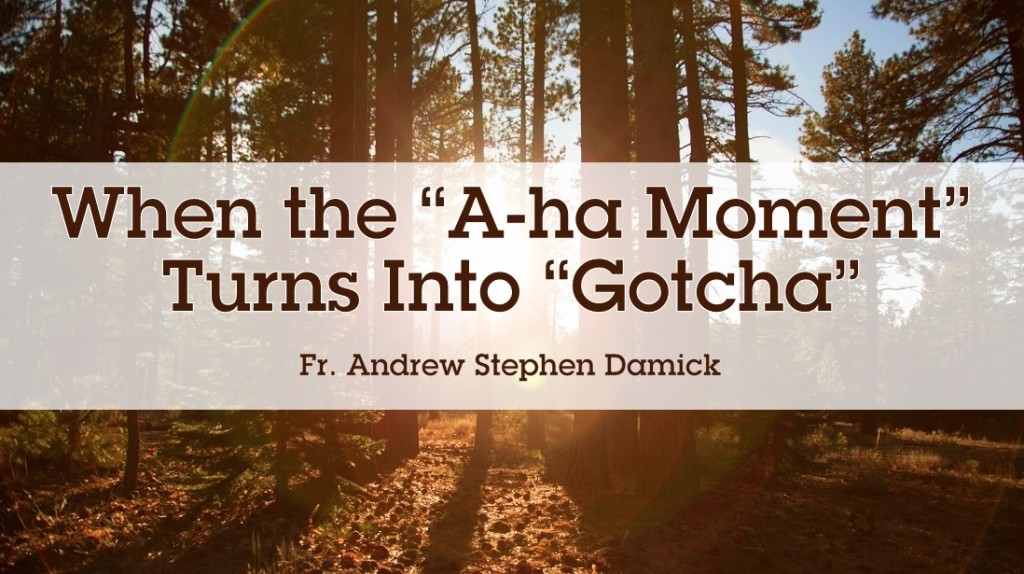
When I was younger, especially in my twenties and early thirties, I was always looking for a sort of “skeleton key” that would explain Life, The Universe and Everything to me (or at least some specific issue), a meta-narrative that brought it all together.
I’ve since learned that the only true narrative in that regard is the Gospel. Every other skeleton key–even theological ones, perhaps especially theological ones–is ultimately broken and false in some way. Figuring you’ve got the “key” to whatever it is you’re looking at always makes you miss something, maybe even something big. The door you thought got you into the innermost sanctum might just be the entrance to a closet.
Or, to use another metaphor, the lens that seems to bring everything into focus also has its own boundaries, and what is outside the horizon may be invisible. The problem is that ideology is substituted for Gospel or for truth, and the truth does not yield a system but something far more complicated. This is the root, by the way, of all fundamentalism and zealotry, whether “left” or “right.” This is the nature of “traditionalism,” too, which Jaroslav Pelikan once defined as “the dead faith of the living,” rather than a true dedication to tradition, which is “the living faith of the dead.” Tradition gets turned into an ideology rather than life.
It’s great to have “a-ha” moments, of course. But sometimes they turn out to be “gotcha” moments, especially regarding other people, their beliefs and their persons. And contrary to what you might think, you probably haven’t actually “gotten” them. You turned them and perhaps their whole way of thinking, believing, living and feeling into an object, something you’ve dealt with and then can wash your hands of. You’re “done.”
I’ve had plenty of “a-ha” moments, moments that I thought were moments of real discovery, that turned out to be “gotchas” against other people or their culture, faith, etc. I had found a single defining concept that I thought encapsulated them and how they believed and lived. But I had actually instead blinded myself to see what was really there. I couldn’t see all the details and complications–sometimes even the majority of what there was to see–because I had found my lens and wanted to look only through that.
That’s not how God works with us, nor should it be how we treat His children, our fellow human persons. It’s okay to search for “keys” or “lenses” that help us to open up and to see people and their beliefs, etc., more easily, but when we reduce them to a label or to a system, we’re not actually seeing them.
Don’t let your “a-ha” turn into “gotcha.”



You write, “I’ve since learned that the only true narrative in that regard is the Gospel.”
That, and much of your article, hints at some of what I felt when discovering Orthodoxy. I’d grown up Roman Catholic and was quite happy as such, even serving as a catechist for adult converts within my parish. I went reading to prove a friend wrong about the truth of Orthodoxy (and we see how that worked out…).
During the process, as I made each new discovery about what the Orthodox Church teaches (and how theology promulgated by Rome had changed post-Schism), I kept having the sense that the Gospels (and the Orthodox Church’s practice) finally had a logical coherence in a way I hadn’t realized they lacked as a Roman Catholic, but all of a sudden realized I’d been uncomfortable with. Rather than seeming like a narrowing of focus, it was almost like the lenses of the Gospel and the practice of the Church were widening and converging, and to borrow the phrase from the Trisagion Prayers (and Fr. Stephen Freeman’s drawing out of the theme in his book), the sense of God and the Church as “everywhere present and filling all things” became extraordinary (and compelling). But it really was more of a widening vision, if that makes sense…a macroscopic view rather than a microscopic one. Living it daily is another issue entirely, of course. The truth really does reveal something a whole lot more complex than a “system.”
Hopefully some of that makes sense…but if not, the TLDR version is that your post resonated, even if in a different way than you intended. 🙂